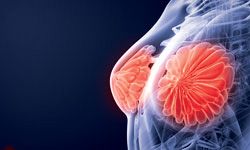Durable Responses Achieved With Off-the-Shelf NK Cell Combo in Triple-Negative Breast Cancer
The combination of off-the-shelf, antibody-targeted natural killer cells and IL-15 superagonist N-083 with low-dose metronomic chemoradiation, adenoviral and year tumor-associated antigen vaccines, and a PD-L1 checkpoint inhibitor had ongoing durable complete responses in patients with triple-negative breast cancer who failed standard-of-care treatment, according to a press release from NantKwest Inc., manufacturer of the NK cell-based therapy.

The combination of off-the-shelf, antibody-targeted natural killer (NK) cells (haNK) and IL-15 superagonist N-083 with low-dose metronomic chemoradiation, adenoviral and year tumor-associated antigen vaccines (MUC1, brachyury, CEA), and a PD-L1 checkpoint inhibitor had ongoing durable complete responses (CRs) in patients with triple-negative breast cancer (TNBC) who failed standard-of-care treatment, according to a press release from NantKwest Inc., manufacturer of the NK cell-based therapy.
This is the first trial in the world to combine a checkpoint inhibitor with off-the-shelf NK plus antigen simulation via adenovirus to induce immune stimulation of both the NK and T cells. The findings from this phase Ib trial were presented at the 2019 San Antonio Breast Cancer Symposium (SABCS) in San Antonio, Texas, on December 13, 2019.
“The approximately 10% to 20% of [patients with breast cancers that] are triple negative are faced with a grim prognosis with limited treatment options. These results are clinically significant, with overall response rates and complete response rates in this highly refractory, advanced metastatic patient population,” Chaitali S. Nangia, MD, a hematologist/oncologist with the Chan Soon-Shiong Immuno-Oncology Network and study co-author, said in a statement.
Out of 9 patients treated, there was a disease control rate of 78% and an overall response rate of 67%. Two patients had ongoing complete responses (CRs) with durations from 8 to 11 months. Additionally, a third patient had a partial response nearing CR following initiation of targeted and endocrine therapy off-study.
Seven patients are alive to date, and the durations of response ranged from 2 to 12 months. Four patients remain on study. The median progression-free survival reported was 13.7 months.
No immune-related serious adverse events (AEs) were related to the immunotherapy investigational agents. Treatment given to all patients in the outpatient setting appeared generally safe and well-tolerated. No cytokine release syndrome was observed.
All patients experienced at least 1 grade ≥3 treatment-related AE (TRAE). The most common TRAEs included chemotherapy-related neutropenia and anemia. Grade ≥3 haNK-related AEs were primarily observed in 2 patients and included fever and fatigue.
“Importantly, these responses to treatment are also durable, with median progression-free survival exceeding 13 months compared to historical controls of approximately 3 months in this heavily pretreated population. We also observed a positive safety and tolerability profile, with no cytokine release syndrome,” added Nangia. “Taken together, these efficacy and safety results point to the emergence of a new treatment paradigm for TNBC.”
To be included in the trial, patients were required to have an ECOG performance status of ≤2 and at least 1 measurable lesion of ≥1.0 cm. They also must have had a formalin-fixed, paraffin-embedded tumor biopsy specimen following the conclusion of the most recent anticancer therapy; if not available, patients had to undergo a biopsy during the screening period to determine safety to be included on the trial.
Patients who had systemic autoimmune disease, history of organ transplant requiring immunosuppression, history of or active inflammatory bowel disease, or inadequate organ function based on select criteria were excluded from the trial.
“We are extremely pleased that the FDA granted us IND [investigational new drug] authorization to initiate this novel immunotherapy trial enabling the safety and efficacy study of multiple novel biological agents administered as a single protocol in the outpatient setting,” Patrick Soon-Shiong, chairman and chief executive officer of NantKwest, said in a statement. “This important trial forms the basis of our approach to induce immunogenic cell death and long-term memory and avoid the ravages of high dose chemotherapy.”
Reference:
NantKwest and ImmunityBio present results of landmark trial of first-in-human natural killer cell combination immunotherapy with durable, complete response data and 78% disease control in refractory triple negative breast cancer at SABCS [press release]. Culver City, CA: NantKwest, Inc; December 16, 2019. bwnews.pr/2PXPR70. Accessed December 19, 2019.